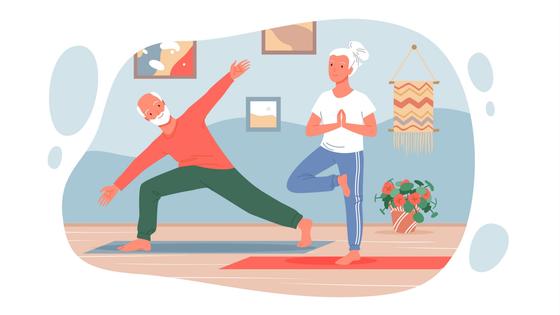It’s Only Just Beginning: How to Change Your Life If It Seems Too Late
If you think it’s too late to search for your calling, master new professions and hobbies, or travel, you’re wrong.

In fact, it is only by the age of 50 that we come to an understanding of our true desires and needs, we reassess the path we have taken, look differently at career achievements, and in many ways change our life priorities and values. Therefore, it is never too late to fulfill a childhood dream or grand plans conceived in youth! The main barrier to changing your life is the fear of the unknown. We found out how not to be afraid to change your life 180 degrees, even if it seems to you that it is already too late.
Tip #1. Evaluate your experience and praise yourself for everything!

For sure, behind you is not only rich life experience and accumulated wisdom, but also a huge amount of professional successes, skills, and knowledge. In order to decide on drastic changes, for example, moving, changing jobs or even professions, do not cross out everything that was before. The expression "to start life with a clean slate" should not be taken literally. On the contrary, make a list of your career and personal achievements, victories, records. It is not at all necessary that this list includes items about the amount of money earned, high positions that you held or continue to hold, real estate and other material assets. Maybe you are proud that you overcame your fear of heights and climbed into the mountains, traveled abroad, raised children, learned to draw from scratch or learned a foreign language. There can be many reasons to be proud and happy for yourself, you just need to think about it and not be so critical of yourself. Such a practice of gratitude will give you confidence, inspire you and make you remember that you have such a wealth of knowledge that no changes are scary!
Tip #2. Determine your true desires and remember what you dreamed of in your youth
Sooner or later, everyone at some point thinks about what their ideal life should be like. Even if you don't have the time or desire to connect your imagination now, just remember what you dreamed of in childhood and youth. In that distant time, you can find the key to your true needs. Maybe you wanted to go into space, become an artist, athlete, scientist, travel, or make scientific discoveries. Of course, not all desires can be fully realized. But even if you take at least a couple of steps to meet your childhood dream, you will feel satisfaction, emotional uplift, and a long-awaited sense of fulfillment. For example, if you dreamed of a sports career, you can sign up for the gym and go to training regularly. Even if you have always been attracted to space, but it is too late to apply to become an astronaut, you can start gradually getting acquainted with space missions and research, studying celestial bodies and astronomical phenomena. All this will not only broaden your horizons, but also serve as fertile ground for new acquaintances, improve the quality of your life and emotional well-being.
Tip #3. Never stop learning new things

In the modern world, trends in the most diverse fields of activity appear at the speed of light. Just like technologies, which are sometimes difficult to keep up with. The only salvation is lifelong learning, or continuous education. Simply put, live and learn. Constant professional development and mastering new skills will allow you not only to get more pleasure from work, but also to feel more confident. By pumping up your competencies, you will create a safety net for the future. That is why following the concept of continuous education is called a safeguard against emotional burnout, doubts and self-doubt, and fear for the future.
Tip #4. Socialize more
It is important to maintain contact with old friends, colleagues and relatives. But don't forget how pleasant new acquaintances can be. The advantages are not only in the impressions received, but also in improving communication skills, unexpectedly emerging career prospects and opportunities for self-realization, as well as acquiring new experience and, of course, support and mutual assistance.
Tip #5. Don't compare yourself to others
Despite the fact that the boundaries of the concept of youth are significantly expanding, the generally accepted age of achieving success is decreasing. The trend "to have time for everything before 30 - to launch a startup, earn your first million, become an industry leader and at the same time an exemplary family man" has a rather negative and demotivating effect on most people, and does not inspire them at all. Of course, giving up comparing yourself to others is not easy. The main thing is to remember that people show others only their best sides, successes and achievements, but what is the true price of their victories is unknown to us. Also, do not forget to remind yourself of your own strengths and advantages (see tip 1!).
Tip #6. Refute stereotypes

Don't think that at 50 or 60 years old the only entertainment will be going to the clinic, crocheting, or preparing pies. Stereotypes associated with age have long been disproved. For example, the McDonald's chain became widespread after Ray Kroc bought several fast food restaurants and turned them into a world-famous brand. At that time, he was already in his fifties. Another inspiring example is self-taught actor Morgan Freeman, who began acting in films when he was in his thirties, but his career began to flourish only twenty years later. The founder and CEO of the American company Thrive Global, Arianna Huffington, launched a startup at the age of 65. And Tracy Chadwell, the creator of 1843 Capital, founded a fund to help startups created by women and aimed at improving the lives of people over 50, when she herself was already 55 years old. All this suggests that restrictions exist only in our heads. Numerous studies confirm this - people in their 50s and 60s can feel happier than young people, they cope better with emotions and emerging problems, have higher stress resistance, and are less likely to suffer from depression.
Therefore, do not forget that real age is not a number in your passport, but the state of your health and cognitive functions. This, in turn, is influenced not by years lived, but by genetics, lifestyle and quality of life, traumatic events and diseases that have occurred. Of course, with age, some functions may indeed decline, but others, such as the ability to concentrate attention, make quick decisions, and competently express emotions, improve.
Tip #7. Don't be shy about expressing yourself and don't look back at your age
Many people after 50 deny themselves bright outfits, parties, active games, because they consider it strange, pretentious or simply not organic for their age. But if you feel younger, why not go to a club or a concert, go rollerblading or sign up for dancing. Moreover, scientists have confirmed that a person's subjective age can be significantly less than the real, chronological one. Therefore, do not hesitate to look the way you sincerely feel.
Your age is an advantage, along with which comes professional experience, worldly wisdom and many skills that are inaccessible to young people. To make it easier and help you decide to change your life, we have prepared a step-by-step guide to transforming your life for the better.
Lectera’s Online Courses by topic
Step #1. Prepare for the upcoming changes

You should not rush into things and drastically change the mundane course of life. In order for this process to be successful and least stressful, you should prepare in advance. For example, think through several scenarios, that is, options for the development of events. So, if you want to learn a new profession and change jobs, break this global goal into several small ones. You will get the following sequence:
-
analyze several educational platforms, courses, online schools, read student reviews, study the training program and choose the most suitable place for further obtaining a new profession;
-
complete training, pass the final project and get a qualification;
-
create a new resume and portfolio, upload it to Internet recruitment sites, use professional social networks like LinkedIn;
-
go through the stages of selection, interview, choose the most suitable vacancy.
The fear of uncertainty, which prevents you from taking active actions, can be overcome with the help of Rene Descartes' method. His "Descartes Square" will help you calculate in advance how your future life will turn out if you accept or do not accept this decision, agree to the offer or refuse it, decide on drastic changes or back down from difficulties. To use this method, you will need a sheet of clean paper or a page in a Google document. Divide it into four equal parts, in each of them write one question:
-
What will happen if this (event, decision, situation) happens?
-
What will happen if this does not happen?
-
What will not happen if this happens?
-
What will not happen if this does not happen?
In order to get a real result, answer each of the questions as fully and extensively as possible. Try to specify the consequences of one event or another, whether it has occurred or not. For example, if we are talking about changing a profession, be sure to specify both the material and non-material aspects of this decision. Perhaps the new profession you have chosen is more highly paid or brings you more satisfaction and joy, because you perceive this activity as creativity, and not just work.
Step #2. Start on Monday
This is not a joke, it is most effective to start changing your life from some important date, for example, a birthday, the first day of the month or the coming week. It is believed that it is at this time, when a starting point appears, people are ready for change and feel more confident. This has been https://faculty.wharton.upenn.edu/wp-content/uploads/2014/06/Dai_Fresh_Start_2014_Mgmt_Sci.pdf, who explain the phenomenon of a new start by the fact that people tend to systematize their lives and divide them into certain periods, like chapters of a novel or episodes of a series. Therefore, it is the new chapter, even if it is only the beginning of another working week, and not a new year, that creates the effect of a clean slate. In addition, this subconsciously helps to overcome the internal fear of failure, thoughts that nothing will work out.
Step #3. Don't take on too much

The risk of giving up on what you have conceived and abandoning changes in life for the better halfway is quite high. As a rule, promises given to oneself - to give up bad habits, finally find a new job, learn a foreign language - are very rarely kept. The reason for this is not only self-doubt, complexes and fear, but also too high expectations of oneself. Therefore, try not to take on too much with the beginning of a new life. For example, you should not immediately sign up for the first online school that catches your eye, so as not to regret your impulsive decision later, and if you decide to learn a foreign language or do sports, do not overdo it, remember that if you learn a hundred words or run a marathon in one day, then the effect will be more negative.
Step #4. Go to the goal with comfort
Often we abandon our goals because we forget about one of the most important components on this path - everyday comfort. It will be much easier to decide on changes, overcome fear, and move towards your new life if you provide comfortable and pleasant conditions for this. This was confirmed by American researchers Ayelet Fishbach and Kaitlin Woolley. They conducted an experiment, divided its participants into two groups and suggested that everyone adhere to the principles of a balanced diet and play sports. However, members of one group themselves chose healthy dishes and physical exercises that they liked, while the other participants in the experiment were not given a choice at all. The results of the first group turned out to be better, there was enough motivation to play sports for longer and people began to choose healthy food more often. Therefore, restrictions on the path to change often interfere. In order not to scold yourself for impulsive purchases, wrong decisions, missed workouts or eaten sweets, make concessions. For example, you can afford not to go to the gym if you have had a hard day at work today. Such a flexible approach to change will allow you to more easily pass the turning point, when you want to give up everything, and more effectively cope with the fear of change.
The main thing is to always keep in mind that finding yourself at 50+ is absolutely normal. The fact is that we are constantly changing, as is the world around us, the social, cultural and technological context. Developing together with society, trying yourself in different areas, mastering new professions and expanding competencies is a more effective and interesting strategy than staying within the framework set by ourselves.
Share this with your friends via:
Latest News

In the UK, £23 million has been allocated for the expansion of the EdTech Testbed program — pilots of educational technologies in schools and colleges.

In the US, Tuskegee University announced the launch of Tuskegee University Global Campus (TUGC) — a new online platform for distance learning.

A significant stage in the development of the alternative education system has begun in West Northamptonshire in the UK: the County Council is actively calling on parents, guardians, and trustees to participate in shaping the future of this key area.

Outwoods Primary School in Atherstone, Warwickshire, having experienced deep sadness after the loss of their famous cat, Silla, has found solace in a new pet – a Maine Coon named Aloysius O’Hara.

In modern universities, artificial intelligence, and in particular ChatGPT, is rapidly transforming from a controversial tool into a full-fledged student assistant.












 Spring skills audit: what to remove, strengthen, and “sow” in learning
Spring skills audit: what to remove, strengthen, and “sow” in learning
 9 Career Mistakes Young Professionals Make
9 Career Mistakes Young Professionals Make
 £23 million allocated for the expansion of EdTech Testbed in the UK
£23 million allocated for the expansion of EdTech Testbed in the UK
 Test: How Psychologically Mature Are You? Check Your Inner Foundation.
Test: How Psychologically Mature Are You? Check Your Inner Foundation.
 Test. Check Your Social Media Dependency Level!
Test. Check Your Social Media Dependency Level!
 Test: What Business is Right For You?
Test: What Business is Right For You?
